
It provides a full account of trade union history and activism across the public sector worldwide. Examining the major political events of the 20th century, the book shows what challenges they presented to the PSI and its major unions. It shows how the public sector responded to the two World Wars, the rise of fascism, the Cold war, and the independence struggles in the former colonies.
It also provides a comprehensive account of the evolution of public service provision, from public health to policing, water, pensions, security and culture. It includes many examples of how the recent liberalization and privatization of public services has failed to secure efficiency and equity.
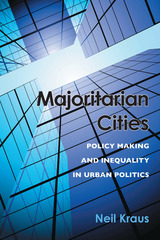
Neil Kraus evaluates both the influence of public opinion on local policy-making and the extent to which public policy addresses economic and social inequalities. Drawing on several years of fieldwork and multiple sources of data, including surveys and polls; initiatives, referenda, and election results; government documents; focus groups; interviews; and a wide assortment of secondary sources, Kraus presents case studies of two Midwestern cities, Minneapolis, Minnesota, and Gary, Indiana. Specifically, he focuses on several major policy decisions in recent decades concerning education, law enforcement, and affordable housing in Minneapolis; and education and riverboat casino development in Gary.
Kraus finds that, on these issues, local officials frequently take action that reflects public opinion, yet the resulting policies often fail to meet the needs of the disadvantaged or ameliorate the effects of concentrated poverty. In light of citizens’ current attitudes, he concludes that if patterns of inequality are to be more effectively addressed, scholars and policymakers must transform the debate about the causes and effects of inequality in urban and metropolitan settings.
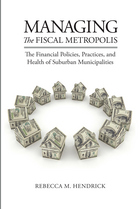
Managing the Fiscal Metropolis: The Financial Policies, Practices, and Health of Suburban Municipalities is an important book. This first comprehensive analysis of the financial condition, management, and policy making of local governments in a metropolitan region offers local governments currently dealing with the Great Recession a better understanding of what affects them financially and how to operate with less revenue.
Hendrick’s groundbreaking study covers 264 Chicago suburban municipalities from the late 1990s to the present. In it she identifies and describes the primary factors and events that affect municipal financial decisions and financial conditions, explores the strategies these governments use to manage financial conditions and solve financial problems, and looks at the impact of contextual factors and stresses on government financial decisions. Managing the Fiscal Metropolis offers new evidence about the role of contextual factors— including other local governments—in the financial condition of municipalities and how municipal financial decisions and practices alter these effects. The wide economic and social diversity of the municipalities studied make its findings relevant on a national scale.
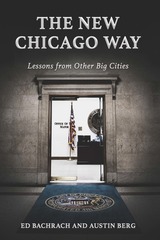
Rather than simply lament the situation, criticize specific leaders, or justify an ideology, Bachrach and Berg compare the decisions about Chicago’s governance and finances with choices made in fourteen other large U.S. cities. The problems that seem unique to Chicago have been encountered elsewhere, and Chicagoans, the authors posit, can learn from the successful solutions other cities have embraced.
Chicago government and its citizens must let go of the past to prepare for the future, argue Bachrach and Berg. A future filled with demographic, technological, and economic change requires a government capable of responding and adapting. Reforms can transform the city. The prescriptions for change provided in this book point toward a hopeful future: the New Chicago Way.
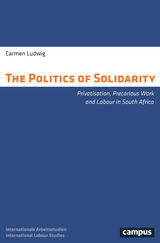
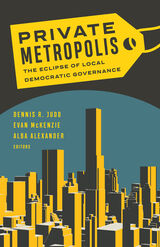
Examines the complex ecology of quasi-public and privatized institutions that mobilize and administer many of the political, administrative, and fiscal resources of today’s metropolitan regions
In recent decades metropolitan regions in the United States have witnessed the rise of multitudes of “shadow governments” that often supersede or replace functions traditionally associated with municipalities and other local governments inherited from the urban past. Shadow governments take many forms, ranging from billion-dollar special authorities that span entire urban regions, to public–private partnerships and special districts created to accomplish particular tasks, to privatized gated communities, to neighborhood organizations empowered to receive private and public funds. They finance and administer public services ranging from the prosaic (garbage collection and water utilities) to the transformative (economic development and infrastructure). Private Metropolis demonstrates that this complex ecosystem of local governance has compromised and even eclipsed democratic processes by moving important policy decisions out of public sight.
The quasi-public institutions of urban governance generally escape the budgetary and statutory restraints imposed on traditional local governments and protect policy decisions from the limitations and vagaries of electoral politics. Moving major policy decisions into a privatized and corporatized realm facilitates efficiency and speed, but at the cost of democratic oversight. Increasingly, the urban electorate is left debating symbolic issues only tangentially connected to the actual distribution of the resources that affect people’s lives.
The essays in Private Metropolis grapple with the difficult and timely questions that arise from this new ecology of governance: What are the consequences of the proliferation of special authorities, privatized governments, and public–private arrangements? Is the trade-off between democratic accountability and efficiency worth it? Has the public sector, with its messiness and inefficiencies—but also its checks and balances—ceded too much power to these new institutions? By examining such questions, this book provokes a long-overdue debate about the future of urban governance.
Contributors: Douglas Cantor, California State U, Long Beach; Ellen Dannin, Pennsylvania State U; Jameson W. Doig, Princeton U; Mary Donoghue; Peter Eisinger, New School; Steven P. Erie, U of California, San Diego; Rebecca Hendrick, U of Illinois at Chicago; Sara Hinkley, U of California, Berkeley; Amanda Kass, U of Illinois at Chicago; Scott A. MacKenzie, U of California, Davis; David C. Perry, U of Illinois at Chicago; James M. Smith, U of Indiana South Bend; Shu Wang, Michigan State U; Rachel Weber, U of Illinois at Chicago.
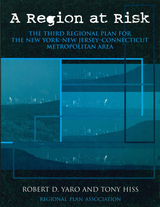
Regional Plan Association, the nation's oldest regional planning organization, has worked since 1929 to improve the quality of life in the New York-New Jersey-Connecticut metropolitan area. The Association has crafted two long-term plans and successfully promoted their implementation through advocacy and coalition building.
The Association's Third Regional Plan describes a series of key initiatives aimed at not only improving quality of life, but also at increasing economic competitiveness, encouraging more sustainable patterns of growth, and expanding opportunities and choice in employment, housing, and community.
The Plan presents five major campaigns, each of which combines the goals of economic, equity, and environmental improvements. They are:
- Greensward -- to protect and restore large natural resource systems at the periphery of urbanized areas
- Centers -- to "recenter" regions that have experienced decades of sprawl growth
- Mobility -- to transform existing transit infrastructure to create a regional express rail network that would dramatically improve public transit, reduce highway congestion, and speed freight movement
- Workforce -- to provide the region's workforce with the skills and opportunities needed to participate in the economy of the future
- Governance -- to rationalize the activities of existing authorities, encourage service sharing among municipal governments, and encourage more effective state and regional land-use planning programs
While focusing on the New York-New Jersey-Connecticut metropolitan area, the Plan's broad themes have universal applicability to regions throughout the industrialized world.

Immersed in their on-demand, highly consumptive, and disposable lifestyles, most urban Americans take for granted the technologies that provide them with potable water, remove their trash, and process their wastewater. These vital services, however, are the byproduct of many decades of development by engineers, sanitarians, and civic planners.
In The Sanitary City, Martin V. Melosi assembles a comprehensive, thoroughly researched and referenced history of sanitary services in urban America. He examines the evolution of water supply, sewage systems, and solid waste disposal during three distinct eras: The Age of Miasmas (pre-1880); The Bacteriological Revolution (1880-1945); and The New Ecology (1945 to present-day).
Originally published in 2000, this abridged edition includes updated text and bibliographic materials. The Sanitary City is an essential resource for those interested in environmental history, environmental engineering, science and technology, urban studies, and public health.
Winner of:
George Perkins Marsh Prize from the American Society for Environmental History Urban History Association Prize for the best book in North American Urban History
Abel Wolman Prize from the Public Works Historical Society
Sidney Edelstein Prize from the Society for the History of Technology
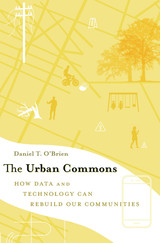
The future of smart cities has arrived, courtesy of citizens and their phones. To prove it, Daniel T. O’Brien explains the transformative insights gleaned from years researching Boston’s 311 reporting system, a sophisticated city management tool that has revolutionized how ordinary Bostonians use and maintain public spaces. Through its phone service, mobile app, website, and Twitter account, 311 catalogues complaints about potholes, broken street lights, graffiti, litter, vandalism, and other issues that are no one citizen’s responsibility but affect everyone’s quality of life. The Urban Commons offers a pioneering model of what modern digital data and technology can do for cities like Boston that seek both prosperous growth and sustainability.
Analyzing a rich trove of data, O’Brien discovers why certain neighborhoods embrace the idea of custodianship and willingly invest their time to monitor the city’s common environments and infrastructure. On the government’s side of the equation, he identifies best practices for implementing civic technologies that engage citizens, for deploying public services in collaborative ways, and for utilizing the data generated by these efforts.
Boston’s 311 system has narrowed the gap between residents and their communities, and between constituents and local leaders. The result, O’Brien shows, has been the creation of more effective policy and practices that reinvigorate the way citizens and city governments approach their mutual interests. By unpacking when, why, and how the 311 system has worked for Boston, The Urban Commons reveals the power and potential of this innovative system, and the lessons learned that other cities can adapt.
READERS
Browse our collection.
PUBLISHERS
See BiblioVault's publisher services.
STUDENT SERVICES
Files for college accessibility offices.
UChicago Accessibility Resources
home | accessibility | search | about | contact us
BiblioVault ® 2001 - 2024
The University of Chicago Press









